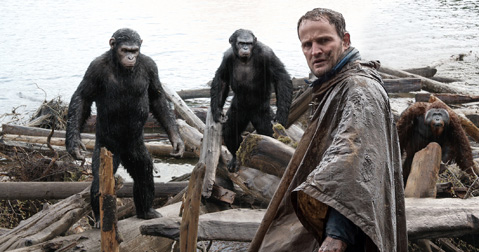Review: Dawn of the Planet of the Apes
Gary Oldman, Keri Russell, and Andy Serkis star in a film written by Mark Bomback, Rick Jaffa, and Amanda Silver and directed by Matt Reeves.

It may be one of the most beautiful B movies ever made. Halfway through this film, a battle between apes and humans is waged on the overgrown post-apocalypse streets of San Francisco. It could have been straightforward fighting, but director Matt Reeves sets it in a dusky light and keeps slowing down and speeding up the action. We see bullets whizzing by like fiery hornets. Light shines on the combatants’ faces, rounding them with blue-green shadows until an explosion creates a wall of flames. Then a crazy bad ape grabs two blazing machine guns and horseback rides through the fire, attacking the humans like a demented hellion. It’s an EC horror comic colored by Caravaggio.
The plot presumably constitutes a transition in the saga of a world where apes evolved from men after the human population gets all but wiped out by a science-created plague. Struggling bands of survivors try to reassert civilization, invading the forested sectors where apes have created a soulful communal life. Oppression becomes the underlying theme, and though it may not be as rich with ideas as Rise of the Planet of the Apes, Reeves’s Dawn is more carefully structured. Everything happens in parallel worlds, and both humans and apes have to finally acknowledge that life on Earth is meant to be fatally flawed — and maybe doomed, too.
Reeves works with brilliant actors, though hardly any big stars, save for Gary Oldman and Keri Russell. Instead, there are the remarkable special effects, apes electronically modeled by great offstage players like Andy Serkis. But the movie never seems like a CGI spectacle, probably because Reeves grounds everything in moody natural settings, hard rains, and poetic ruins. It’s obviously a goofy science-fiction-meets-O. Henry idea: If evolution took off without us, who would mind the store? But Reeves makes that stoner idea seem full of tension and regret. Impossibly, he uses monkeyshines to illustrate the limits of human nature.



